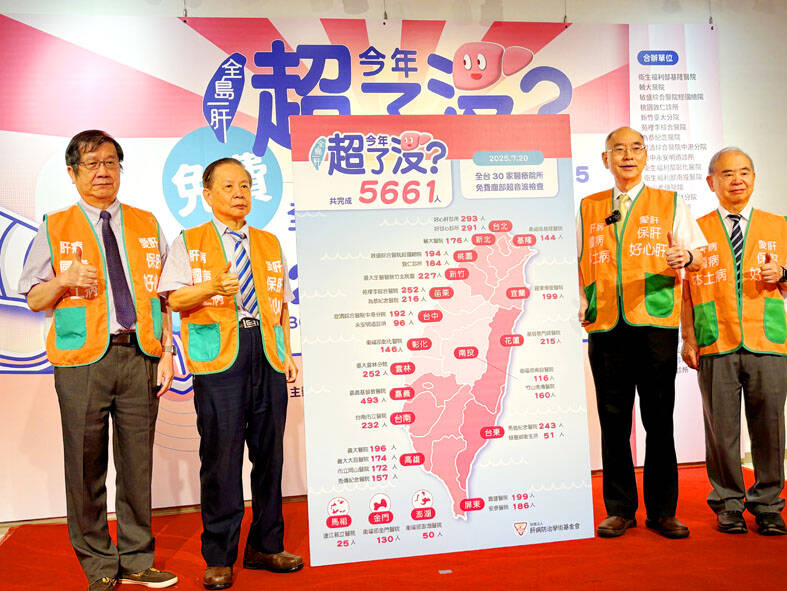After more than half of the participants in a free screening yesterday were found to have a fatty liver, health experts are urging people aged 30 and older to undergo regular abdominal ultrasounds to detect liver disease early and reduce the risk of liver cancer.
The Liver Disease Prevention and Treatment Foundation conducted 5,661 free abdominal ultrasounds, discovering abnormalities in 4,614 people, or 81.5 percent, foundation chief executive officer Yang Pei-ming (楊培銘) told a news conference following the screenings.
Among those screened, 3,103 people, or 54.8 percent, were diagnosed with fatty liver disease, indicating that it is becoming a significant national health concern, Yang said.

Photo: Lin Chih-yi, Taipei Times
Fatty liver could progress to hepatitis, lead to liver fibrosis and cirrhosis, and ultimately result in liver cancer, he said.
Over the past 30 years, Taiwan has successfully reduced cases of hepatitis B and C through widespread hepatitis B vaccines and new oral medications for hepatitis C, reducing the number of liver cancer cases caused by these diseases, Yang said.
Controlling fatty liver is the next crucial step in preventing liver cancer, as cancer cases caused by fatty liver are increasing annually, he said.
Fatty liver, especially non-alcoholic fatty liver, is a growing concern among Taiwanese due to lifestyle and perception changes, and is a key factor in liver cancer prevention, he added.
Similar trends have been observed in Japan, Europe and the US, where fatty liver is closely associated with overnutrition and obesity, and is no longer regarded solely as a metabolic issue, but as a potential risk factor for cancer, he said.
Eating less and exercising more is the best way to prevent the disease, he added.
Yang urged people aged 30 and older to undergo routine abdominal ultrasound screenings to monitor their health and ensure early detection of any potential liver cancer cases.
Only 44.5 percent of liver cancer cases in Taiwan are diagnosed at an early stage, significantly lower than Japan’s 65.7 percent. This contributes to higher rates of late-stage liver cancer and mortality in Taiwan, Yang said.
Among people who had regular screenings last year, about 77 percent of those who developed liver cancer were diagnosed at an early stage, which gave them a high chance for a cure or disease control, National Health Insurance Administration data showed.
When liver issues are detected early through regular screenings, up to 90 percent of liver cancer cases are found at an early stage and can be cured, Yang said.
“If everyone pays attention to liver health, there is hope that Taiwan could eliminate liver disease,” he said.
Yesterday’s screenings also revealed 131 cases of suspected liver cancer or liver tumors of unknown nature, 11 cases of liver cirrhosis and 498 cases of liver parenchymal disease.
Additionally, 1,225 cases of benign liver tumors were identified, along with 48 cases of an enlarged spleen, and 612 cases of gallbladder polyps.
The screenings also uncovered 98 people with abdominal tumors in the pancreas, spleen or kidneys, and 2,149 cases of other issues, such as liver calcifications, gallstones, and cysts or stones in the pancreas, spleen or kidneys.

Nipah virus infection is to be officially listed as a category 5 notifiable infectious disease in Taiwan in March, while clinical treatment guidelines are being formulated, the Centers for Disease Control (CDC) said yesterday. With Nipah infections being reported in other countries and considering its relatively high fatality rate, the centers on Jan. 16 announced that it would be listed as a notifiable infectious disease to bolster the nation’s systematic early warning system and increase public awareness, the CDC said. Bangladesh reported four fatal cases last year in separate districts, with three linked to raw date palm sap consumption, CDC Epidemic Intelligence

The manufacture of the remaining 28 M1A2T Abrams tanks Taiwan purchased from the US has recently been completed, and they are expected to be delivered within the next one to two months, a source said yesterday. The Ministry of National Defense is arranging cargo ships to transport the tanks to Taiwan as soon as possible, said the source, who is familiar with the matter. The estimated arrival time ranges from late this month to early next month, the source said. The 28 Abrams tanks make up the third and final batch of a total of 108 tanks, valued at about NT$40.5 billion

Two Taiwanese prosecutors were questioned by Chinese security personnel at their hotel during a trip to China’s Henan Province this month, the Mainland Affairs Council (MAC) said yesterday. The officers had personal information on the prosecutors, including “when they were assigned to their posts, their work locations and job titles,” MAC Deputy Minister and spokesman Liang Wen-chieh (梁文傑) said. On top of asking about their agencies and positions, the officers also questioned the prosecutors about the Cross-Strait Joint Crime-Fighting and Judicial Mutual Assistance Agreement, a pact that serves as the framework for Taiwan-China cooperation on combating crime and providing judicial assistance, Liang

A group from the Taiwanese Designers in Australia association yesterday represented Taiwan at the Midsumma Pride March in Melbourne. The march, held in the St. Kilda suburb, is the city’s largest LGBTQIA+ parade and the flagship event of the annual Midsumma Festival. It attracted more than 45,000 spectators who supported the 400 groups and 10,000 marchers that participated this year, the association said. Taiwanese Designers said they organized a team to march for Taiwan this year, joining politicians, government agencies, professionals and community organizations in showing support for LGBTQIA+ people and diverse communities. As the first country in Asia to legalize same-sex